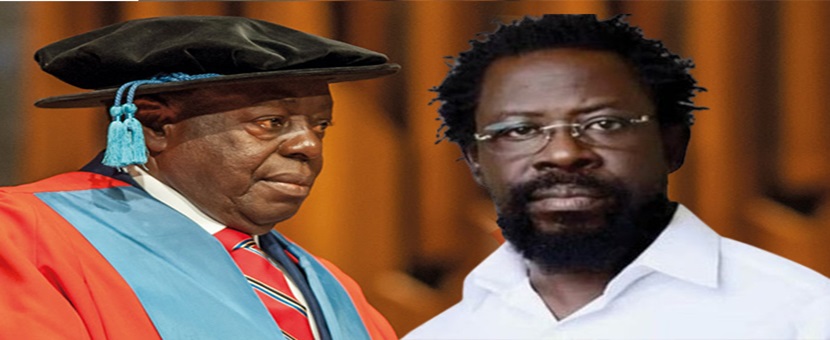The arrest and prosecution of Dele Farotimi Esq. for alleged criminal defamation of Aare Afe Babalola SAN, has raised some fundamental concerns. The public uproar against Mr. Farotimi’s prosecution is mainly tied to the idea of preserving the constitutional right to freedom of expression and decriminalisation of defamation. This sentiment wrestles against Aare Afe Babalola’s right to protect his hard-earned reputation which he believes Mr. Farotimi has maligned.
Beyond these competing rights, a critical evaluation of the issues throws up even another range of compelling points touching on the ethics of the legal profession and the integrity of the Nigerian justice system.
I find that defamation is both a criminal act and a civil wrong in some states in Nigeria. While decriminalisation of defamation is a global trend, criminal defamation remains in some of our law books in Nigeria, and any aggrieved person reserves the right to explore remedies available in criminal law.
Aare Afe Babalola opted to pursue criminal action against Mr. Farotimi. Interestingly, Mr. Farotimi, the author of Nigeria and Its Criminal Justice System, now has a date with the system.
The Charge against Mr. Farotimi at Ado-Ekiti Magistrate Court
Mr. Farotimi faces a 16-count Charge before the Magistrate Court in Ado-Ekiti, Ekiti State, the home state of Aare Afe Babalola. The Charge was preferred against Mr. Farotimi under the Criminal Code Act with particular reference to mainly sections 59(1), 373 and 375 of the Criminal Code Act.
Let me use this opportunity to clear the common confusion related to the Criminal Code Act and Criminal Code. The Criminal Code Act is an Act of the National Assembly which establishes the Criminal Code. That is, the Criminal Code itself is annexed to the Criminal Code Act only as a schedule to the Act. Thus, strictly speaking, the Criminal Code Act and the Criminal Code are not precisely the same and cannot be used interchangeably.
Therefore, sections 59(1), 373 and 375 are sections of the Criminal Code and not Criminal Code Act as erroneously stated in the Charge against Mr. Farotimi. But generally, the law is that an error in citing criminal laws or a charge preferred under a wrong law does not necessarily defeat a criminal case as long as the offence exists in a written law in operation.
Background Facts
The Charge against Mr. Farotimi was instituted following a petition written by Aare Afe Babalola. The entire Charge centres around some grave allegations allegedly published by Mr. Farotimi in his book, Nigeria and Its Criminal Justice System. The gist of the matter is that Mr. Farotimi allegedly accused Aare Afe Babalola of having “corrupted the Supreme Court to procure a fraudulent judgment in the service of his clients.” According to the Charge, Mr. Farotimi was accused of defaming not only Aare Afe Babalola but also Olu Daramola, Olu Faro and the law offices of Aare Afe Babalola & Co. (Emmanuel Chambers), allegedly accusing them of compromising the Supreme Court.
Mr. Farotimi was arraigned on 4 December 2024 but was reportedly remanded in prison custody until 10 December 2024 when a formal application for bail is expected to be heard. From the reports, the Magistrate declined to grant bail based on the oral application of Mr. Farotimi’s Counsel.
Considering that defamation is a bailable offence, one would have expected that the Magistrate would have granted Mr. Farotimi bail in judicious and judicial exercise of discretion without demanding a formal written application.
In his article, Aare Afe Babalola criticised the requirement for written application for bail, relying on Abiola v. FRN [1995] 1 NWLR (Pt. 370) 155. In his words:
It is said in law that Justice is not a one way traffic. A person who has been accused of infraction of a law and thereby arraigned before a court of law is still deserving of the protection of the law applicable to his case. The law relating to bail is one of such. It must be respected at all times and in relation to all persons. Ordering the remand into prison of a person who under the constitution enjoys a presumption of innocence pending the filing of a written application for bail is erroneous as the higher courts have ordered that application for bail can be made orally. An order to file [a] written application for bail is a great disservice to the cause of justice.
It is quite ironic that the Magistrate in the instant criminal case involving Aare Afe Babalola and Mr. Farotimi decided to insist on an oral application for bail.
Another curious information available from the reports is that the prosecution urged the Court to remand Mr. Farotimi pending the conclusion of the investigation. Again, herein lies one of the problems of our justice system. What is the justification for charging Mr. Farotimi to Court when investigation is yet to be concluded as claimed?
Defamation under the Criminal Code
The offence of defamation (defamatory matter) is defined under section 373 of Nigeria’s Criminal Code:
Defamatory matter is [a] matter likely to injure the reputation of any person by exposing him to hatred, contempt, or ridicule, or likely to damage any person in his profession or trade by any injury to his reputation. Such matter may be expressed in spoken words or in any audible sounds, or in words legibly marked on any substance whatever, or by any sign or object signifying such matter otherwise than by words, and may be expressed either directly or by insinuation or irony.
The punishment for defamation is provided under section 375 of the Criminal Code—“any person who publishes any defamatory matter, is guilty of a misdemeanor and is liable to imprisonment for one year; and any person who publishes any defamatory matter knowing it to be false, is liable to imprisonment for two years.”
However, you risk 7 years imprisonment if you publish a defamatory matter or threaten to publish it with intent to extort money or other property from a target—Section 376.
Is Defamation a Crime in Ekiti State?
In Ekiti State, we have the Criminal Law of Ekiti State, 2021 which repealed the Criminal Code Law, Cap. C16, Laws of Ekiti State, 2012. The Charge against Mr. Farotimi was instituted under the Criminal Code.
It is not clear whether defamation has been decriminalised in Ekiti State given that there is no mention of it under the Criminal Law of Ekiti State, 2021. Perhaps, this accounts for the reason the prosecution preferred to come under sections 373 and 375 of the Criminal Code (the sections relied on in most of the counts) while completely avoiding the Criminal Law of Ekiti State. Also, as seen in count 1 of the charge against Mr. Farotimi, the prosecution came under section 59(1) of the Criminal Code which criminalises the publication of false news with intent to cause fear and alarm to the public. This is similar to section 39(1) of the Criminal Law of Ekiti State, 2021. But the prosecution preferred the Criminal Code.
A fundamental legal question is whether Mr. Farotimi can be validly charged for an offence under the Criminal Code in Ekiti State. This is arguable in view of the existence of the Criminal Law of Ekiti State, 2021.
The Defence
Assuming the charge of defamation framed under the Criminal Code against Mr. Farotimi is held to be valid (though not conceded), one of the most potent defences available to him is truth. If the statements allegedly published by Mr. Farotimi in his book is true, the case of defamation would most likely fail. Section 377 of the Criminal Code provides that “The publication of defamatory matter is not an offence if the publication is, at the time it is made, for the public benefit and if the defamatory matter is true.”
Thus, Mr. Farotimi has the herculean task of proving all the allegations contained in his book against Aare Afe Babalola and other members of his firm. I believe it is an uphill task because proving corruption in the judiciary is as difficult as proving, by direct evidence, the offence of rape. This is because such offences, if indeed the allegations were true, are typically hatched under utmost secrecy. It is mostly compelling circumstantial evidence that is capable of saving the day. In the absence of credible evidence, Mr. Farotimi’s liberty may hang in the balance for a while. Criminal conviction and possible imprisonment may not be the end of it. Being a legal practitioner, the gatekeepers of the legal profession may be waiting in the corner for Mr. Farotimi at the end of the case to enforce the Rules of Professional Conduct.
Decriminalisation of Defamation
Decriminalisation of defamation—the idea of removing defamation from the realm of criminal law—has since become a global trend. The basic idea is not necessarily to completely allow a person to willfully tarnish the image of another on the notion of exercising one’s right to freedom of expression without any repercussions. Rather, the idea is to restrict defamation to a civil action where a person who claims to have been defamed would be compensated in damages instead of the State embarking on prosecution.
In the Supreme Court case of Clement Aviomoh v. Commissioner of Police, Ogunwumiju, JSC went to town in making a strong case for the decriminalisation of defamation. The Learned Jurist gave a historical perspective to the law of criminal defamation and identified some countries of the world that have abolished criminal defamation—countries such as England, Ghana, Sierra Leone, Lesotho, including the Council of Europe. Interestingly, in Nigeria, Lagos State and Edo State have also decriminalised defamation as found by the Supreme Court.
Ogunwumiju, JSC clearly furnished some compelling reasons for decriminalisation of defamation as follows (at p. 116):
First, the wrong occasioned by defamation can be adequately remedied by a civil action with the award of damages and other ancillary reliefs to ensure that the particular defamatory act is not repeated. Secondly, the criminal law is an instrument of last resort because of its potential to interfere with the liberty of the citizen…The argument is that where other branches of the law or administrative remedies can adequately address the wrong sought to be criminalised, there is no overarching public interest in punishing the act through the criminal law. Allied to this is the argument that there is currently a phenomenon of overcriminalisation. This is the use of the criminal law to address problems which can be adequately addressed through other branches of the law or through administrative process. Another concern that also provides a basis for decriminalizing defamation is its potential to unduly interfere with the constitutionally guaranteed right to freedom of expression. This argument, while recognising that the right to freedom of expression is not absolute, argues that criminalisation may unduly restrict the exercise of the right. This argument supports the use of less coercive civil remedies of damages and other ancillary reliefs as sufficient safeguards against abuse of the right to freedom of expression. The remedy of damages (and other ancillary reliefs) is considered sufficient.
The Learned Jurist acknowledged that using criminal law to punish a person for defamation is purely excessive. Again, hear her:
It may be argued that punishing defamation with criminal conviction and pain of imprisonment is excessive and out of proportion to the objective of protecting the reputation damaged by defamation when the civil law provides sufficient remedy to the person aggrieved.
In concluding its Judgment, the Court reluctantly refused to declare the relevant provisions of the Penal Code on defamation as unconstitutional at the stage of the proceedings in that case. It held that “A crime is what the legislature calls a crime no matter how archaic or unpalatable. It is left to the courts adjudicating on these laws to ensure that no miscarriage of justice occurs in its enforcement. The rule of law today allows everyone with a legitimate cause or grievance to avail himself of remedies available in criminal law.”
However, the Supreme Court strictly disapproved the idea of pursuing unwarranted criminal matters (such as criminal defamation) in the following words (at p. 120):
However, a complainant who initiates a prosecution with the knowledge that criminal proceedings are unwarranted and the remedy lies in the civil law, should be made accountable by the law in punitive damages for pursuing misconceived criminal proceedings. I think it is important for this court to set guidelines for the lower courts to ensure safeguards in this regard.
Is the Prosecution of Mr. Farotimi Unwarranted?
To my mind, the pertinent question is whether the prosecution of Mr. Farotimi is unwarranted. A close look at the allegations allegedly published in his book leaves one with mixed feelings. Admittedly, the allegations are serious. To allegedly describe Aare Afe Babalola—a man with a heavy profile and a global icon of inestimable worth—as “the grandmaster of judicial corruption in Nigeria” is quite grave.
Considering the pedigree of Aare Afe Babalola, how much in damages would be really adequate and sufficient to compensate him assuming the publication by Mr. Farotimi is found to be defamatory?
Conversely, in the event that Mr. Farotimi is found guilty, convicted, and sentenced for defamation, how will that conviction cure the reputational damage?
I do not pretend to have all the answers to these questions. But what I do know is that Mr. Farotimi is currently being prosecuted in a manner that appears to be designed to “punish” him even before his guilt is established. Refusing an oral application for his bail and consequently remanding him in prison custody pending the filing of a formal written application is, with respect, unjustified . Again, I rely on the words of Aare Afe Babalola when he stressed:
[A] person is constitutionally entitled to his liberty. Even when he is brought before a Court of law to answer for the alleged commission of a crime, he would still be entitled to bail and a presumption of his innocence. Despite this, it is still common nowadays to read that a Judge before whom an accused person has been arraigned, has ordered the counsel to the said accused person to file formal applications supported with affidavits to ask for the bail of the said accused person after which the said accused person is then ordered to be remanded in prison custody pending the hearing and determination of the application for bail. This is very wrong. The requirement of a formal written application law is unknown to law where the application for bail is made before the Judge or Court before whom the accused has been arraigned.
Conclusion
I generally share the opinion that defamation should be decriminalised in all states in Nigeria. Defamation should be confined within the realm of civil law, and the courts are enjoined to stand up in protection of the reputation of those who deserve the protection. No person should be allowed to abuse the right to freedom of expression by tarnishing the image of another without legal consequence. When a person is defamed on the basis of exercise of freedom of expression, the shame and disgrace the victim suffers is capable of reducing the person’s self-worth, denying the person the confidence to even publicly express himself or herself. Aare Afe Babalola should consider a civil action to protect the integrity of his reputation instead of resorting to criminal prosecution founded on defamation.
In an interesting twist, while the Charge based on criminal defamation is pending at the Magistrate Court in Ekiti against Mr. Farotimi, fresh report has it that the Inspector General of Police has filed fresh charges at the Federal High Court, Ado-Ekiti, Ekiti State, under section 24 of the Cybercrimes Act. I hope to address this in another post.
Indeed, Mr. Farotimi is on a long date with Nigeria and its criminal justice system which he wrote about. We await the outcome.














